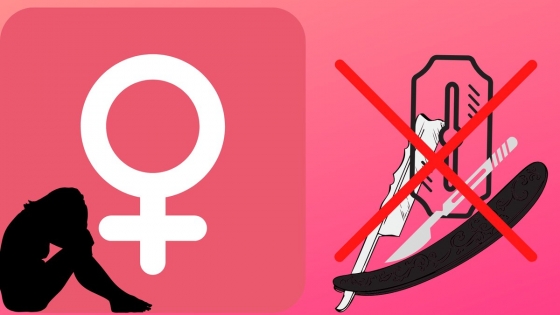Female genital mutilation (FGM) is a violation of girls’ and women’s human rights that involves changing or damaging the female genitalia for non-medical reasons.
It’s extreme discrimination against women and girls and reflects sex inequality. The practise infringes their rights to health, security, physical integrity, freedom from torture and cruel, inhuman, or degrading treatment, and life if it kills them.
To stop FGM, organised and systematic efforts must involve whole communities and focus on human rights and gender equality. Social discussion and community empowerment to abolish the practise should be the focus of these initiatives.
They must also address women and girls’ sexual and reproductive health needs.
Zero Tolerance For FGM Day
Female genital mutilation, rooted in gender inequity, restricts women and girls’ rights and potential. Compared to 30 years ago, girls are a third less likely to undergo the hazardous procedure. Change can be led by men and boys.
FGM can cause serious infection, prolonged agony, depression, infertility, and death. Its roots are unknown, but it has been practised by societies throughout history. Recent decades have seen decreases, but to attain the 2030 global aim of zero incidences, the pace must be 10 times faster.

To make matters worse, only $275 million is scheduled to be invested to fulfil this target in 31 priority nations, leaving a $2.1 billion resource shortfall. Humanitarian disasters like disease, climate change, and war might also set civilization back.
Ending FGM With Men And Boys.
With eight years left in this decade of action, collaborations with men and boys may help abolish the practise, change deeply ingrained societal and gender norms, and empower girls and women to realise their health, education, economic, and equality rights.
Partnership with Men and Boys to Transform Social and Gender Norms to End FGM is this year’s theme.
By engaging men and boys, the global society can speed forward the end of this practise and elevate women and girls’ voices. Such programmes have garnered male allies, including religious and traditional leaders, health professionals, law enforcement officers, civil society members, and grassroots organisations, protecting women and girls.
Partnerships with men and boys can stop FGM worldwide by 2030. Join the social media conversation. Spread #MenEndFGM!
Also Read Day Of International Action To Reduce Disaster Risk
UN Women Statement On International Day Of Zero Tolerance For Female Genital Mutilation, 6 February 2017.
In spite of the fact that there has been a general decrease in the prevalence of female genital mutilation (FGM) across countries, this progress is likely to be offset by rapid population growth in countries where FGM occurs if efforts to eliminate the practice are not renewed in light of recent research and urgently stepped up.
This is because FGM is a culturally accepted practice in many of these countries. Continue reading.

UN Women Executive Director Phumzile Mlambo-Ngcuka said, “It’s time to eliminate FGM and give girls choices for their bodies and future.”
At least 200 million girls and women worldwide have had female genital mutilation (FGM). By 2030, 15 million more females may be affected if trends continue. On International Day of Zero Tolerance for Female Genital Mutilation, #endFGM.
Attention Editors
The UN General Assembly declared February 6th the International Day of Zero Tolerance for Female Genital Mutilation in 2012 to boost and focus efforts to end this practice.
The UNFPA–UNICEF Joint Programme on the Elimination of Female Genital Mutilation targets 17 countries where the practice is common. To remove power inequalities that drive this harmful practice, the program helps girls and women realize their rights in health, education, income, and equality.

Also Read Must Know Information About Angola Liberation Day
About Female Genital Mutilation: Currentaffairs.Adda247.Com/International-Day-Of-Zero-Tolerance-For-Female
Female genital mutilation (FGM) is a violation of girls’ and women’s human rights, health, and integrity. Female genital mutilation causes intense pain, shock, profuse bleeding, infections, and difficulties urinating, as well as long-term effects on sexual, reproductive, and mental health. …
Zero Tolerance for Female Genital Mutilation Day
According to the WHO, 120–140 million women have experienced FGM and 3 million girls are at risk each year (WHO). FGM includes all non-medical procedures that remove part or all of the female genitalia. This technique violates human rights and causes deadly bleeding.

February 6, 2003 was the first UN International Day of Zero Tolerance for Female Genital Mutilation. It also fights FGM through other means.
Also Read World Nutella Day, What Is History And Fact Know Here
International Zero Tolerance For Female Genital Mutilation Day
On February 6 of each year, a variety of events and activities are held to promote the United Nations’ effort to educate people about the hazards of female genital mutilation and create awareness about the issue (FGM).
Survivors of female genital mutilation (FGM) are frequently featured at public conferences and forums, where they are given the opportunity to relate their personal experiences.
Other activities include things like photo essays and round-table conversations on how to end female genital mutilation (FGM) legally.
Public Life The International Day of Zero Tolerance for Female Genital Mutilation is not a holiday but rather a global observation that takes place on December 6th.

